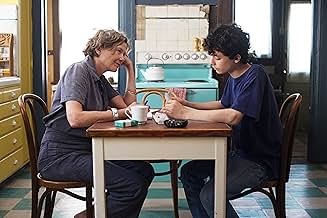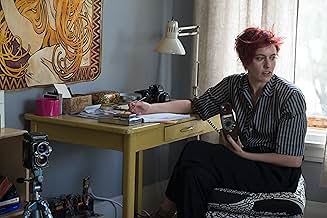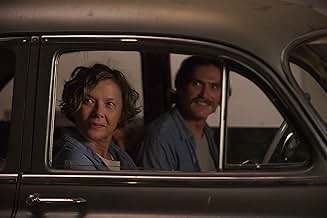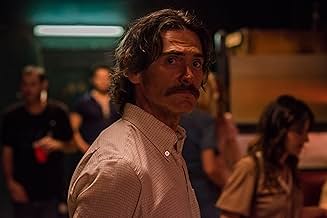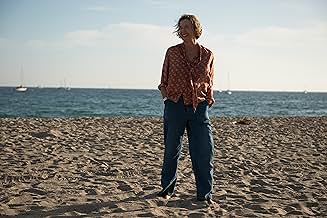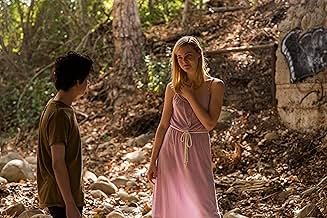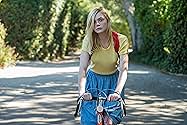ÉVALUATION IMDb
7,3/10
51 k
MA NOTE
L'histoire d'un adolescent, de sa mère et de deux autres femmes qui aident à l'élever dans une atmosphère d'amour et de liberté en Californie du Sud en 1979.L'histoire d'un adolescent, de sa mère et de deux autres femmes qui aident à l'élever dans une atmosphère d'amour et de liberté en Californie du Sud en 1979.L'histoire d'un adolescent, de sa mère et de deux autres femmes qui aident à l'élever dans une atmosphère d'amour et de liberté en Californie du Sud en 1979.
- Nommé pour 1 oscar
- 15 victoires et 82 nominations au total
Vitaly Andrew LeBeau
- Young Jamie Fields
- (as Vitaly A. Lebeau)
Avis en vedette
This is a very strong film, unless you only like fast-paced action films; I'm going to go out on a limb and say you'll probably like this movie.
As is the norm with A24... it's a good film.
I don't really have much to complain about. I belied in the world of the film, I believed the characters were real, etc-- the world and logic of the film was well established. There were a few tropes of the genre, but some strong writing and direction makes one look past this without really thinking about it. I actually cared about the story and wanted to see how things played out.
The story is a bit disjointed, but I think that works to the film's benefit due to the type of storytelling it's going for, which overall is very effective.
I'd recommend this film to pretty much everyone that likes good movies.
8 out of 10
As is the norm with A24... it's a good film.
I don't really have much to complain about. I belied in the world of the film, I believed the characters were real, etc-- the world and logic of the film was well established. There were a few tropes of the genre, but some strong writing and direction makes one look past this without really thinking about it. I actually cared about the story and wanted to see how things played out.
The story is a bit disjointed, but I think that works to the film's benefit due to the type of storytelling it's going for, which overall is very effective.
I'd recommend this film to pretty much everyone that likes good movies.
8 out of 10
Elle Fanning uggh yes. Okay, now that that's out of the way lets get to this film. This seemed like an unconventional coming of age film and that is basically what this was. Its not a mindblowingly amazing film and has some flaws. However, what I thought was a flaw may have worked for another viewer. What I can say though, is that the film left a better impression on me than I thought it would.
The performances of this film are great, particularly that of Greta Gerwig and Annette Bening. Gerwig is such a real character who is pained but absolutely does what she wants to do in life. She has a hard time finding love but her very open nature makes her identifiable. Bening is tremendous in the best role I've seen from her. She's an easygoing mother who is worried about her son and how he deals with life. Remarkably cool but nuanced. Also, Elle Fanning good lord I love her. Okay, I had to get that out of my system again. All of the characters have substantial depth and you do not leave the film feeling like a character's story was underdeveloped. The main core of characters are all in close proximity with each other and through their interactions you get to see their turmoils, struggles, and comfortable nature with each other.
The stories of the characters of the film are at times told by themselves and they seem to be telling the story from a future time, where they have experienced the entirety of their lives. I liked this technique of expansive storytelling. However, there are other things in the film that don't work as well. The slideshow of images of the culture of the 70's seemed gimmicky and didn't exactly add to the film's narrative. It seemed like an attempt to be able to grab viewers but wasn't exactly necessary. There are also times where the scenes have a "psychedelic effect" where the car races off in the highway in a dreamy haze, full with the colors of the rainbow emanating from the car. Again, I thought this was quite gimmicky and trying to harden the fact that this film was supposed to be set in the 70s.
I think one of the things that worked with the film was its humor. There is a lot of it, and while its not always subtle and funny a good amount of it works to make you chuckle or really laugh. Its not something I was expecting but is definitely something that made the film more memorable. There are some scenes that really, really work and help you really want to live in the frame of the characters. The film really focuses on women at the time and a teenage boy trying to navigate in a sea of women in his life. While its not always accurate about men, I think its doing a pleasant job of trying to connect the two while showing some of the plights experienced when men and women try to understand each other. What you get here is a well acted, humorous films that works to entertain.
7/10
The performances of this film are great, particularly that of Greta Gerwig and Annette Bening. Gerwig is such a real character who is pained but absolutely does what she wants to do in life. She has a hard time finding love but her very open nature makes her identifiable. Bening is tremendous in the best role I've seen from her. She's an easygoing mother who is worried about her son and how he deals with life. Remarkably cool but nuanced. Also, Elle Fanning good lord I love her. Okay, I had to get that out of my system again. All of the characters have substantial depth and you do not leave the film feeling like a character's story was underdeveloped. The main core of characters are all in close proximity with each other and through their interactions you get to see their turmoils, struggles, and comfortable nature with each other.
The stories of the characters of the film are at times told by themselves and they seem to be telling the story from a future time, where they have experienced the entirety of their lives. I liked this technique of expansive storytelling. However, there are other things in the film that don't work as well. The slideshow of images of the culture of the 70's seemed gimmicky and didn't exactly add to the film's narrative. It seemed like an attempt to be able to grab viewers but wasn't exactly necessary. There are also times where the scenes have a "psychedelic effect" where the car races off in the highway in a dreamy haze, full with the colors of the rainbow emanating from the car. Again, I thought this was quite gimmicky and trying to harden the fact that this film was supposed to be set in the 70s.
I think one of the things that worked with the film was its humor. There is a lot of it, and while its not always subtle and funny a good amount of it works to make you chuckle or really laugh. Its not something I was expecting but is definitely something that made the film more memorable. There are some scenes that really, really work and help you really want to live in the frame of the characters. The film really focuses on women at the time and a teenage boy trying to navigate in a sea of women in his life. While its not always accurate about men, I think its doing a pleasant job of trying to connect the two while showing some of the plights experienced when men and women try to understand each other. What you get here is a well acted, humorous films that works to entertain.
7/10
20th Century Women isn't about giving us some epic look at a group of friends or a family, but it is about the passage of time with people who are warm and caring and in a genuine way. Mike Mills isn't a saccharine filmmaker, but he also doesn't shy away from sentiment - I always have to point out this is separate from sentimentality - and the feeling that I came away with from the comedy 20th Century Women is this warmth from all of the characters, and this feeling that I know these people, whether I did or didn't (and I actually did in the sense that, at times, the mother and son were me and my mom for a short period of my teenage years, so there's an authenticity just there to me).
There's so much empathy for everyone here that it adds to the authenticity of the emotions, even for Greta Gerwig's Abbie who is, in essence, another 'Greta Gerwig' character like I've seen, or think I've seen, in other movies (her quirky wisdom seems akin to last year's Mistress America at least). While she is my least favorite person in this movie, she's given a history and many moments, surrounding one of those terrible things that happens to people and there's not much to be done about it, or could've, it's out of the hands of anything *to* be done. There's so much work done on the characters here by Mills, getting us to like them despite all of their flaws or those moments where they don't act with logic or sense, that it doesn't matter that there isn't too much of a story. This is the story of these characters in a short span of time while also, as if looking on from some other, ethereal plane, about what this time meant in the context of what came before 1979, and what was to come.
Among the actors here, Lucas Jade Zumann is the breakout star as the 15 year old Jamie, but I was so taken with Benning and Fanning as the 50-ish, "she was in the depression" as she's described mother and the 2 years older than Jamie but that matters so much pleutonic friend respectively. I wonder if the film would've worked with any other actors in the roles, but really I can't imagine anyone else. Every time Bening's on screen she gives Dorothea this feeling of 'well... I guess this is happening now, what do I do about it, I'm not sure', and while she can get angry or concerned she's never one to go too over the top - this is the anti-Fences in that regard of being about a kid scarred by a parent - she does care about what happens to her son, with the "inciting incident" in screen writing terms being him almost dying from doing one of those dumb-s*** things teenagers do on a dare. It's a unique and subtle performance, filled with a sense of... questioning, uncertainty, which is harder to pull off than it looks.
Fanning, meanwhile, is also having to underplay, which is good to see. This is an impressive year for her between this, Live by Night (which she was the best part of) and the Neon Demon, and she's different in all of them. I want to say I like the work she does here the most even as (or because) it's the least likable one among the bunch (and keep in mind she's a born-again Christian in the South in LbN). Mills's writing provides Fanning a great deal to make Julie come alive, but I found her not saying things, the way she shows Jamie how to hold a cigarette, when she is saying little, and then when she is backed into doing something that she should want to do but doesn't go for - going past being 'just friends' with Jamie in the last third - how she responds is devastating. It's like, 'no, don't act this way', as opposed to simply looking at her as a "B"-word, which is how a hackier writer could've gone with it.
Oh, and I must reiterate this is a comedy, and it's funny as hell. There's certainly some dramatic stretches, but Mills mines a lot of humor out of generational splits - Bening's face as she hears early Black Flag, and then trying to "move" to it with Billy Crudup, is one of the funniest things this year - and it's a tricky balance that Mills finds between making the feminism (yes, actual literature and quotes spoken in voice-over from essays) serious AND humorous. We don't doubt that the feminism of the characters is pure, but there's also that question that's posed: how much is really appropriate, or can be legitimately understood, by 15 year old who barely knows who he is in this world?
And on top of this Mills is having fun and some daring as a filmmaker, using psychedelic colors to show cars driving at times, and going not for the slow-motion but fast-motion speed, but not for comedy - the aesthetic point matches up with what the movie's about: life moves too fast, and we have to try and keep up with it best as we can and grow with things and become better people as everything moves too quickly. If it's ultimately too episodic to be anything really great or up to be there with the very best this year, I'd still tell anyone who likes smart character independent(ish) movies centered on teenagers and adults to see it immediately; it has a good place alongside The Squid and the Whale and, to a less taboo extent, Diary of a Teenage Girl.
There's so much empathy for everyone here that it adds to the authenticity of the emotions, even for Greta Gerwig's Abbie who is, in essence, another 'Greta Gerwig' character like I've seen, or think I've seen, in other movies (her quirky wisdom seems akin to last year's Mistress America at least). While she is my least favorite person in this movie, she's given a history and many moments, surrounding one of those terrible things that happens to people and there's not much to be done about it, or could've, it's out of the hands of anything *to* be done. There's so much work done on the characters here by Mills, getting us to like them despite all of their flaws or those moments where they don't act with logic or sense, that it doesn't matter that there isn't too much of a story. This is the story of these characters in a short span of time while also, as if looking on from some other, ethereal plane, about what this time meant in the context of what came before 1979, and what was to come.
Among the actors here, Lucas Jade Zumann is the breakout star as the 15 year old Jamie, but I was so taken with Benning and Fanning as the 50-ish, "she was in the depression" as she's described mother and the 2 years older than Jamie but that matters so much pleutonic friend respectively. I wonder if the film would've worked with any other actors in the roles, but really I can't imagine anyone else. Every time Bening's on screen she gives Dorothea this feeling of 'well... I guess this is happening now, what do I do about it, I'm not sure', and while she can get angry or concerned she's never one to go too over the top - this is the anti-Fences in that regard of being about a kid scarred by a parent - she does care about what happens to her son, with the "inciting incident" in screen writing terms being him almost dying from doing one of those dumb-s*** things teenagers do on a dare. It's a unique and subtle performance, filled with a sense of... questioning, uncertainty, which is harder to pull off than it looks.
Fanning, meanwhile, is also having to underplay, which is good to see. This is an impressive year for her between this, Live by Night (which she was the best part of) and the Neon Demon, and she's different in all of them. I want to say I like the work she does here the most even as (or because) it's the least likable one among the bunch (and keep in mind she's a born-again Christian in the South in LbN). Mills's writing provides Fanning a great deal to make Julie come alive, but I found her not saying things, the way she shows Jamie how to hold a cigarette, when she is saying little, and then when she is backed into doing something that she should want to do but doesn't go for - going past being 'just friends' with Jamie in the last third - how she responds is devastating. It's like, 'no, don't act this way', as opposed to simply looking at her as a "B"-word, which is how a hackier writer could've gone with it.
Oh, and I must reiterate this is a comedy, and it's funny as hell. There's certainly some dramatic stretches, but Mills mines a lot of humor out of generational splits - Bening's face as she hears early Black Flag, and then trying to "move" to it with Billy Crudup, is one of the funniest things this year - and it's a tricky balance that Mills finds between making the feminism (yes, actual literature and quotes spoken in voice-over from essays) serious AND humorous. We don't doubt that the feminism of the characters is pure, but there's also that question that's posed: how much is really appropriate, or can be legitimately understood, by 15 year old who barely knows who he is in this world?
And on top of this Mills is having fun and some daring as a filmmaker, using psychedelic colors to show cars driving at times, and going not for the slow-motion but fast-motion speed, but not for comedy - the aesthetic point matches up with what the movie's about: life moves too fast, and we have to try and keep up with it best as we can and grow with things and become better people as everything moves too quickly. If it's ultimately too episodic to be anything really great or up to be there with the very best this year, I'd still tell anyone who likes smart character independent(ish) movies centered on teenagers and adults to see it immediately; it has a good place alongside The Squid and the Whale and, to a less taboo extent, Diary of a Teenage Girl.
The scene feels remarkably familiar – Dorothea (Bening), the matron and saint of a Santa Barbara household circa 1979 leans in on her son Jamie (Zumann) listening to "Fairytale in the Supermarket" by The Raincoats. "They know they sound terrible right?" she says. Abbie (Gerwig), Dorothea's avant-garde lodger interjects; "yeah, but it's like they don't care. They got all this feeling but don't have the tools they need to express it
it all comes out as passion." Dorothea fixates on Abbie's intonation, like listening to language she's only now grasping. She gets it...but then she doesn't.
Much like Abbie's defense of The Raincoats, Dorothea believes she has all the passion to be a proper mother, but she lacks the right tools to support a son who is growing older with each passing moment. She decides to enlist the help of two young women; Julie, Jamie's best friend and crush and Abbie a free spirit who was recently treated for cervical cancer. The only other man in the picture is William (Crudup) a well-meaning former hippie with a gift for mechanics and a passion for pottery. Between them all, the stalwart Dorothea hopes to quietly guide her son through his formative years which pit her depression era approach, to Jamie's recession era resentments. "Don't you need a man to raise another man?" asks Julie. "No I don't think you do." 20th Century Women starts with competing voice-overs and uses a collage approach to convey the surfaces of each character's inner life. The collages are stuffed to the brim with stills of 1930's gloom and 1960's turbulence all set to audio of proto-punk, Jimmy Carter's Malaise Speech and "As Life Goes By" from Casablanca (1942). It's an awkward mix; one that creates an echo chamber of sorts.
That subtle discordance of people talking at and not to each other, runs through the first half of the film. Jamie's coming-of-age story, a volatile mix of stubborn familial resentment and unrequited love clobbers together with Dorothea's own midlife crisis. "I had Jamie when I was 40." Dorothea says; a fact that can help explain Dorothea's free-range parenting approach, but also helps explain why Jamie's sharp insights cut so deep. For a while there it always seems like its Jamie versus Dorothea, pulled apart by an ever widening generational gap.
Then, like responding to the blessing of a wartime parlay, the factions in this film begin to center and calm. It is during this truce that the film begins to really take off, presenting its characters with vibrancy and humanity while flying through a more nuanced story arc. Almost independently both Jamie and Dorothea learn their goals are one in the same and the differences they have are little compared to their mutual respect for time which presents itself in rainbow tinged tracking shots and subtle fast-forwards.
And at the center of 20th Century Women lies the affable Annette Bening who suitably captures the zeitgeist of a generation no longer with us. While most might pigeonhole Dorothea as a madcap eccentric or worse a passive pushover, Bening wisely lets the character's inner strength shine through. Dorothea is unabashedly a one of a kind lady. She invites strangers to dinner, invites herself to punk clubs, leaves early, and then comes back days later alone. She verves uncomfortably with post-sexual revolution mores yet she quietly takes frank conversations about menstruation in stride. She does all this because she knows that with every encounter, every meeting, every stranger there's a chance for exchange.
Of course 20th Century Women is not without its problems. While Bening, Gerwig and Fanning all do wonders in their roles, Zumann fails to endear the young Jamie to the audience in any meaningful way. Part of it is due to the part as it is written. The film is loosely based on the life of director Mike Mills thus Jamie at times feels more like an avatar than a real teenager. Additionally it's ironic that despite constant paraphrasing of feminist literature, 20th Century Women would struggle to pass the Bechdel Test. Our three women characters orbit Jamie's life and analyze his actions and motives like he's the center of their universe.
Yet, while the film uses the wider Women's Liberation movement as window dressing, allowing the external conflicts of the film to melt away to reveal honest internal pain was a stroke of genius. Genius enough to maybe be interpreted as a meta-text on standard storytelling practices being a form of patriarchal oppression. That however is a discussion for another day. 20th Century Women is an artfully rendered film with plenty to say about the passage of time, the commonality between the generation gaps and the unifying love of mother and son.
Much like Abbie's defense of The Raincoats, Dorothea believes she has all the passion to be a proper mother, but she lacks the right tools to support a son who is growing older with each passing moment. She decides to enlist the help of two young women; Julie, Jamie's best friend and crush and Abbie a free spirit who was recently treated for cervical cancer. The only other man in the picture is William (Crudup) a well-meaning former hippie with a gift for mechanics and a passion for pottery. Between them all, the stalwart Dorothea hopes to quietly guide her son through his formative years which pit her depression era approach, to Jamie's recession era resentments. "Don't you need a man to raise another man?" asks Julie. "No I don't think you do." 20th Century Women starts with competing voice-overs and uses a collage approach to convey the surfaces of each character's inner life. The collages are stuffed to the brim with stills of 1930's gloom and 1960's turbulence all set to audio of proto-punk, Jimmy Carter's Malaise Speech and "As Life Goes By" from Casablanca (1942). It's an awkward mix; one that creates an echo chamber of sorts.
That subtle discordance of people talking at and not to each other, runs through the first half of the film. Jamie's coming-of-age story, a volatile mix of stubborn familial resentment and unrequited love clobbers together with Dorothea's own midlife crisis. "I had Jamie when I was 40." Dorothea says; a fact that can help explain Dorothea's free-range parenting approach, but also helps explain why Jamie's sharp insights cut so deep. For a while there it always seems like its Jamie versus Dorothea, pulled apart by an ever widening generational gap.
Then, like responding to the blessing of a wartime parlay, the factions in this film begin to center and calm. It is during this truce that the film begins to really take off, presenting its characters with vibrancy and humanity while flying through a more nuanced story arc. Almost independently both Jamie and Dorothea learn their goals are one in the same and the differences they have are little compared to their mutual respect for time which presents itself in rainbow tinged tracking shots and subtle fast-forwards.
And at the center of 20th Century Women lies the affable Annette Bening who suitably captures the zeitgeist of a generation no longer with us. While most might pigeonhole Dorothea as a madcap eccentric or worse a passive pushover, Bening wisely lets the character's inner strength shine through. Dorothea is unabashedly a one of a kind lady. She invites strangers to dinner, invites herself to punk clubs, leaves early, and then comes back days later alone. She verves uncomfortably with post-sexual revolution mores yet she quietly takes frank conversations about menstruation in stride. She does all this because she knows that with every encounter, every meeting, every stranger there's a chance for exchange.
Of course 20th Century Women is not without its problems. While Bening, Gerwig and Fanning all do wonders in their roles, Zumann fails to endear the young Jamie to the audience in any meaningful way. Part of it is due to the part as it is written. The film is loosely based on the life of director Mike Mills thus Jamie at times feels more like an avatar than a real teenager. Additionally it's ironic that despite constant paraphrasing of feminist literature, 20th Century Women would struggle to pass the Bechdel Test. Our three women characters orbit Jamie's life and analyze his actions and motives like he's the center of their universe.
Yet, while the film uses the wider Women's Liberation movement as window dressing, allowing the external conflicts of the film to melt away to reveal honest internal pain was a stroke of genius. Genius enough to maybe be interpreted as a meta-text on standard storytelling practices being a form of patriarchal oppression. That however is a discussion for another day. 20th Century Women is an artfully rendered film with plenty to say about the passage of time, the commonality between the generation gaps and the unifying love of mother and son.
The status of "too personal" could be its basic virtue. and its sin. because it represents a chronicle. about "80 decade, about family life in large sense, about sexual education and motherhood. and, sure, about freedom. in same measure, it is a film with precise target. remembering independent films, near to every day details too much, it is the film who could be an experience, usuful in profound sense, or just waste of time. but, out of that too easy definitions, it is an admirable work. for script, performances - the kind of film in which each actor seems be the only wise choice for his character - but, first, for Annette Bening who does a magnificent job as middle age mother, in war against her past, insecure about future, without courage to become herself, appentice of her son, discovering the essence of life next her friends. a great film. really !
Le saviez-vous
- AnecdotesDuring rehearsals, the cast was encouraged to bring in music they believed their characters listened to. Then, to encourage familiarity among the cast, there would be a dance party where the only rule was that everyone had to dance and it didn't matter what the song was.
- GaffesDorothea is variously depicted discussing her stock portfolio with her son Jamie, quoting NYSE share prices in decimals, doing this in 1979. However, the switch to decimal from fractional stock prices in the U.S. did not occur until the year 2000.
- ConnexionsFeatured in WatchMojo: Top 10 Movies of 2016 Already Getting Oscar Buzz (2016)
- Bandes originalesDon't Worry About the Government
Written by David Byrne
Performed by Talking Heads
Courtesy of Sire Records
By arrangement with Warner Music Group Film & TV Licensing
Meilleurs choix
Connectez-vous pour évaluer et surveiller les recommandations personnalisées
- How long is 20th Century Women?Propulsé par Alexa
Détails
- Date de sortie
- Pays d’origine
- Sites officiels
- Langue
- Aussi connu sous le nom de
- 20th Century Women
- Lieux de tournage
- East Beach, Santa Barbara, Californie, États-Unis(Santa Barbara, CA)
- sociétés de production
- Consultez plus de crédits d'entreprise sur IMDbPro
Box-office
- Budget
- 7 000 000 $ US (estimation)
- Brut – États-Unis et Canada
- 5 664 764 $ US
- Fin de semaine d'ouverture – États-Unis et Canada
- 111 200 $ US
- 1 janv. 2017
- Brut – à l'échelle mondiale
- 7 214 806 $ US
- Durée1 heure 59 minutes
- Couleur
- Mixage
- Rapport de forme
- 2.00 : 1
Contribuer à cette page
Suggérer une modification ou ajouter du contenu manquant

Lacune principale
What is the streaming release date of Les femmes du 20e siècle (2016) in Canada?
Répondre






